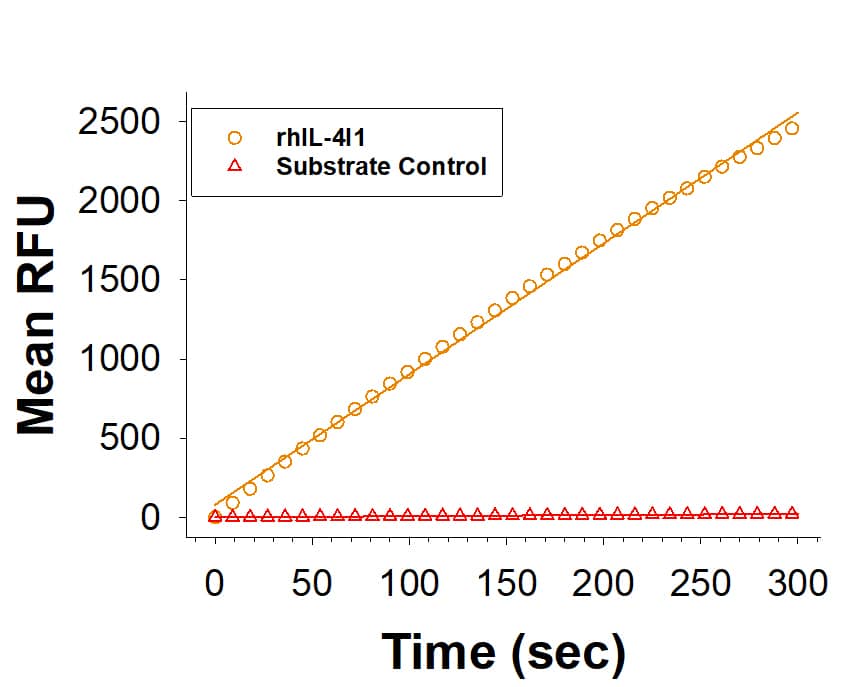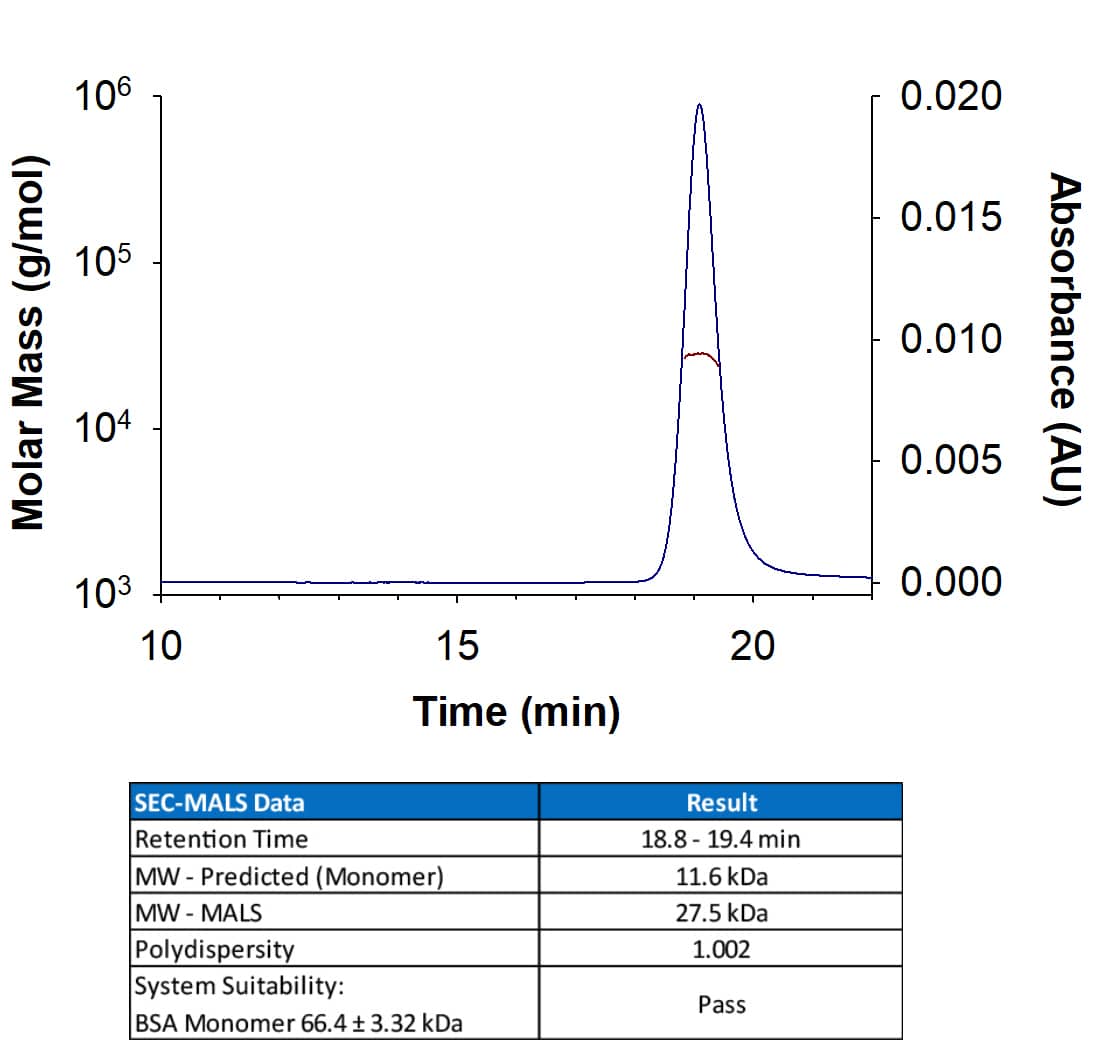Recombinant Human PTPR sigma Protein, CF Summary
Product Specifications
Glu30-Gly1260, with a C-terminal 6-His tag
Analysis
Customers also Viewed
Product Datasheets
Carrier Free
CF stands for Carrier Free (CF). We typically add Bovine Serum Albumin (BSA) as a carrier protein to our recombinant proteins. Adding a carrier protein enhances protein stability, increases shelf-life, and allows the recombinant protein to be stored at a more dilute concentration. The carrier free version does not contain BSA.
In general, we advise purchasing the recombinant protein with BSA for use in cell or tissue culture, or as an ELISA standard. In contrast, the carrier free protein is recommended for applications, in which the presence of BSA could interfere.
3430-PR
| Formulation | Lyophilized from a 0.2 μm filtered solution in HEPES and NaCl. |
| Reconstitution | Reconstitute at 500 μg/mL in PBS. |
| Shipping | The product is shipped at ambient temperature. Upon receipt, store it immediately at the temperature recommended below. |
| Stability & Storage: | Use a manual defrost freezer and avoid repeated freeze-thaw cycles.
|
Background: PTP sigma/PTPRS
Phosphatase Receptor-type sigma (PTPR sigma ), also known as PTP sigma, is a 200 kDa type I transmembrane glycoprotein that is a member of the class 2A (LAR) subfamily of the protein tyrosine phosphatase (PTP) family (1). Human PTPR sigma cDNA encodes 1948 amino acids (aa) including a 29 aa signal sequence, a 1253 aa extracellular domain (ECD) with three C2-type Ig domains and eight Fibronectin (Fn) type III domains, a transmembrane domain, and a cytoplasmic region with two PTP domains (1, 2). Multiple differentially expressed splice variants lack sections of the Ig and/or Fn domains and/or cytoplasmic juxtamembrane sequence (1, 2). PKC activation in the cell promotes endoprotease cleavage of PTPR sigma, releasing the 140-160 kDa ECD (3). The human PTPR sigma ECD shares 93% aa sequence identity with the nearest isoform of mouse and rat PTPR sigma, 96% with bovine PTPR sigma, and 97% with porcine PTPR sigma. Activity of PTPR sigma can be inhibited by bisphosphonates (2). PTPR sigma is a receptor for several proteins, including neural chondroitin sulfate proteoglycans which inhibit nerve regeneration (4, 5). It also binds and dephosphorylates targets such as N-Cadherin, E-Cadherin, EGF R and Ret (6-9). Through these interactions PTPR sigma affects pituitary and neuroendocrine development, and axon growth and targeting (4-6). Mice deleted for PTPR sigma show pituitary, pancreatic, and gut abnormalities, mainly due to growth hormone insufficiency (9-12). They also show enhanced regeneration, but faulty targeting, of injured peripheral nerves (4-6, 13). Head and neck squamous cell cancers frequently underexpress PTPR sigma (14). Since PTPR sigma inhibits EGF R signaling pathways, its underexpression can enhance tumor cell growth (14).
- Pulido, R. et al. (1995) Proc. Natl. Acad. Sci. USA 92:11686.
- Endo, N. et al. (1996) J. Bone Miner. Res. 11:535.
- Aicher, B. et al. (1997) J. Cell Biol. 138:681.
- Shen, Y. et al. (2009) Science 326:592.
- Duan, Y. and R.J. Giger (2010) Sci. Signal. 3:pe6.
- Siu, R. et al. (2007) Mol. Cell. Biol. 27:208.
- Vijayvargia, R. et al. (2004) Biochem. Biophys. Res. Commun. 325:344.
- Uetani, N. et al. (2009) J. Clin. Invest. 119:924.
- Muise, A.M. et al. (2007) Curr. Biol. 17:1212.
- Elchebly, M. et al. (1999) Nat. Genet. 21:330.
- Batt, J. et al. (2002) Mol. Endocrinol. 16:155.
- Chagnon, M.J. et al. (2006) Can. J. Physiol. Pharmacol. 84:755.
- McLean, J. et al. (2002) J. Neurosci. 22:5481.
- Morris, L.G. et al. (2011) Proc. Natl. Acad. Sci. USA 108:19024.
FAQs
No product specific FAQs exist for this product, however you may
View all Proteins and Enzyme FAQsRecombinant Proteins
Reconstitution Buffers
Reviews for Recombinant Human PTPR sigma Protein, CF
There are currently no reviews for this product. Be the first to review Recombinant Human PTPR sigma Protein, CF and earn rewards!
Have you used Recombinant Human PTPR sigma Protein, CF?
Submit a review and receive an Amazon gift card.
$25/€18/£15/$25CAN/¥75 Yuan/¥2500 Yen for a review with an image
$10/€7/£6/$10 CAD/¥70 Yuan/¥1110 Yen for a review without an image













